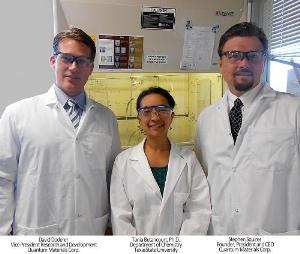Oct 3 2013
Quantum Materials Corporation today announced it has entered into an MOU and University – Industry Partnership Agreement with Texas State University (TSU) in San Marcos, Texas, a short distance from Quantum Materials Corp headquarters at STAR Park.
 (PRNewsFoto/Quantum Materials)
(PRNewsFoto/Quantum Materials)
Stephen Squires, Quantum Materials Corp Founder and CEO said, "Texas State is an extraordinary partner for joint nanotechnology and biotech research and will expand the knowledge and acceptance of tetrapod quantum dots while at the same time finding new uses in the form of marketable products."
Stephen Frayser, Executive Director of STAR Park stated, "This university-industry agreement between Quantum Materials Corp. and Texas State University is a prime example of the type of collaboration STAR Park facilitates by providing incubator companies partnering opportunities with Texas State's specialized university programs, facilities and faculty resources which will accelerate delivery of new technologies to the market."
Texas State's Advanced Functional Materials Laboratory, outfitted with state-of-the-art characterization and analysis equipment will assist Quantum Materials' nearby Wet Labs in special projects designed to produce department scientific papers advancing tetrapod quantum dot research. The University - Industry partnership, strong programs and excellent facilities expand the research capabilities of Quantum Materials and will aid its efforts to successfully produce and market quantum dots products.
David Doderer, QMC VP for R&D added, "Quantum Materials will provide sponsored research, industry training, employment, and aid course development through the partnership. The university's interdisciplinary approach and commercialization component goals ensure complete discussion on each topic area resulting in productive ideas and actions for research. It is a pleasure to work with TSU."
Quantum Materials manufactures both Cadmium-based and Non-Heavy-Metal (Cadmium-Free) Tetrapod Quantum Dots. Colloidal Tetrapod QD are tetrahedrally symmetric nanocrystals with wurtzite arms exhibiting bright and narrow emission, uniquely capable of dual emissions from one energy source and also singularly unique as micromechanical stress gauges measurable by color shifting of their energy gap when bending under strain.
TSU is one of eight Texas Emerging Research Universities and uses an interdisciplinary research focus combining the university's biology, chemistry, biochemistry, physics, engineering, engineering technology and business school programs. A Doctoral program in Materials Science, Engineering and Commercialization teaches and trains candidates to be effective innovators and entrepreneurs with 21st Century skills. The program uses nearby STAR Park businesses to assist and teach commercialization of nanotech and biotech products by giving relevant business purposes to university research.
QUANTUM MATERIALS CORPORATION, INC has a steadfast vision that advanced technology is the solution to global issues related to cost, efficiency and increasing energy usage. Quantum dot semiconductors enable a new level of performance in a wide array of established consumer and industrial products, including low power lighting and displays and biomedical diagnostic applications. QMC's volume manufacturing methods enables cost reductions moving laboratory discovery to commercialization.